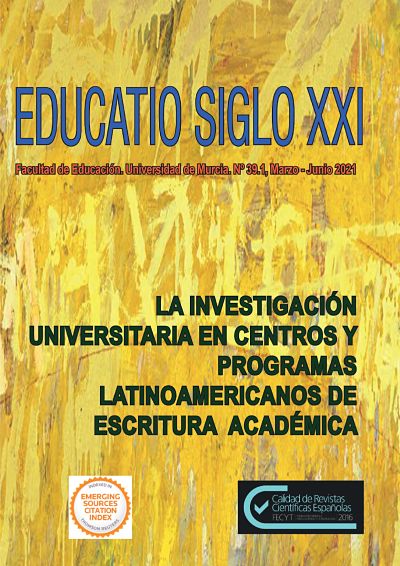Building inferences in reading comprehension: A correlational study
Abstract
This piece of research aims to identify if there is any correlation between passing a reading university course (with Spanish as a first language) and an improvement in reading comprehension, compared with the reading level obtained before attending the classes. After testing our reading comprehension tool among different pilot groups, we reach the final version, which has two different texts: the first one is a technical text, which requires readers to make propositional inferences, and the second one is a humanistic text, which requires readers to make pragmatic inferences. The analysis of the results was undertaken in two phases: first, we evaluated the reading comprehension level of each text, and second, we compared both levels to know if students who had passed had a higher reading comprehension level than students who had never taken this reading course. The discussion showed that there is not any correlation between technical test performance and humanistic test performance; neither is there a correlation between passing the subject and the level of reading comprehension. Moreover, reading comprehension did not show any significant improvement. In sum, after taking the entire course, students are still unable to perform the mental operations needed to reach the representation level (propositional or pragmatical) expected to comprehend both text types.
Downloads
-
Abstract22675
-
PDF (Español (España))8851
References
Cañas, A. y Novak, J. (2006). La teoría subyacente a los mapas conceptuales y a cómo construirlos. Reporte Técnico IHMC CmapTools 2006-01. Florida: Florida Institute for Human and Machine Cognition.
Chikalanga, I. (1992). A Suggested Taxonomy of Inferences for the Reading Teacher. Reading a Foreign Languaje, 8 (2), 697-709 pp.
Cros, E. (1993). Sociología de la literatura. En M. Angenot, M. et al., Teoría literaria (145-171 pp.). México: Siglo XXI.
Cuenca, J. y Hilferty, J. (2006). Introducción a la lingüística cognitiva. Barcelona: Ariel.
Gadamer, H. (1993). Verdad y método. Salamanca: Sígueme.
Hewitt, P. (2007). Física conceptual. México: Pearson Educación.
Ingarden, R. (1998). La obra de arte literaria. México: Alfaguara.
Morín, E. (1999). Los siete saberes necesarios para la educación del futuro. París: Organización de las Naciones Unidas para la Educación, la Ciencia y la Cultura.
Ricoeur, P. (1999). Teoría de la interpretación: discurso y excedente de sentido. México: Siglo XXI.
Savater, F. (18 de mayo de 1997). ¿Mundo homogéneo?. El país semanal, p. 10.
Tuffanelli, L. (2010). Comprender. ¿Qué es? ¿Cómo funciona?. Madrid: Narcea-Ministerio de Educación.
Van Dijk, T., & Kintsch, W. (1983). Strategies of discourse comprehension. New York: Academic Press.
Copyright (c) 2021 Servicio de Publicaciones de la Universidad de Murcia

This work is licensed under a Creative Commons Attribution-NonCommercial-NoDerivatives 4.0 International License.
Original work publishes in this journal is subject to the following terms:
1. Murcia University Press (the publishing house) holds the copyright of the publishes work, and favours and allows their reutilization under the use license stated in point 2.
© Servicio de Publicaciones, Universidad de Murcia, 2015
2. Work is published in the electronic edition under a license (Creative Commons Reconocimiento-NoComercial-SinObraDerivada 4.0 España (legal text). They can be copied, used, disseminated, transmitted and publicly presented, as long as: i) authorship and original publication source is acknowledged (journal, publishing house and URL of the work); ii) are not used for commercial purposes; iii) the existence and specifications of this use license is stated.
3. Conditions for self-archive. Authors are allowed and encouraged to disseminate electronically the pre-pint (before review) and/or post-print (accepted for publication) versions of their work before their publication since that favours earlier circulation and dissemination resulting in an increased chance for the authors to be cited and for the work to reach a bigger share of the academic community. Colour: RoMEO: green.








